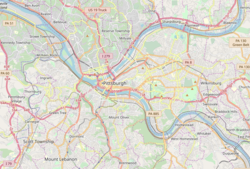History and architectural features
Construction on the building was completed in 1909, with Daniel Burnham being the principal designer. [2] [3] It was listed on the National Register of Historic Places in 1991. [1] [4]
Henry Clay Frick originally commissioned the building. [2] Following the Chicago school of architecture style, the building features a granite base and terracotta exterior. [2]
Beginning sometime around the 1960s, the building gradually fell into disrepair coinciding with the decline of East Liberty. A classical ornament on the roof was replaced with substandard material, allowing water to enter the basement. Over time, the interior essentially was destroyed. [2]
The Highland Building subsequently experienced twenty years of complete dormancy during the latter part of the twentieth century and early twenty-first century. With assistance from the state of Pennsylvania and the Urban Redevelopment Authority of Pittsburgh, a new renovation effort was launched in 2012 to restore the exterior and reconstruct the interior of the Highland Building, attach it to the adjacent three-story Wallace Building and convert the entire complex into one hundred and twenty-seven apartments. The project, now completed, is described as, "Walnut on Highland" and is mostly leased. Recently, the last of the retail space in the Wallace Building was filled by a Mexican Restaurant. [5] [6]
This page is based on this
Wikipedia article Text is available under the
CC BY-SA 4.0 license; additional terms may apply.
Images, videos and audio are available under their respective licenses.





